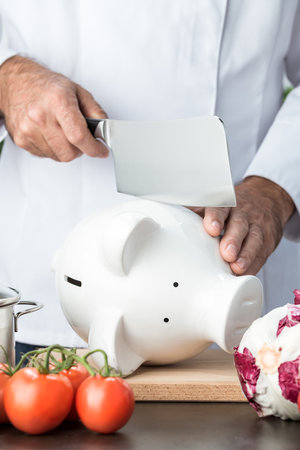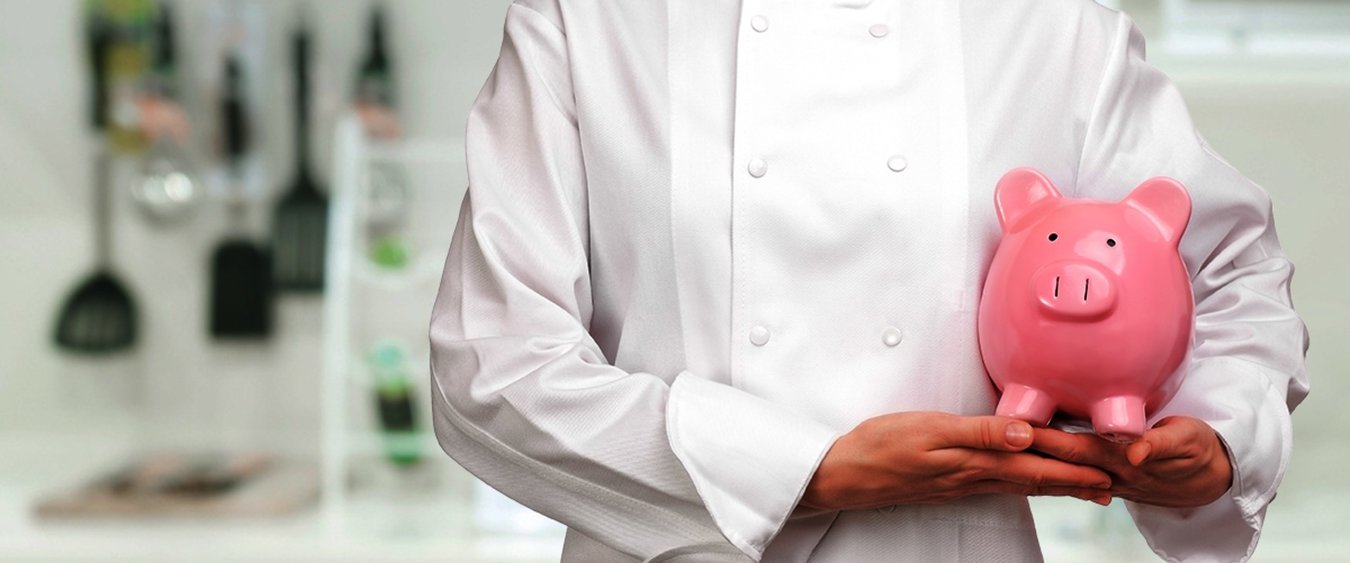1. Managing food costs doesn't have to be a nightmare, but requires prudent spending.
The Houston Chronicle offers helpful guidance on controlling food expenditures, but they first suggest breaking your costs down per diner: divide your monthly food expenses by your total number of diners in that month for a quick estimate. Your expenses will include the cost of food as well as any delivery charges or other fees. Be sure to account for loss from spoilage or over-buying, theft and meal re-dos from returned food. This can give you a benchmark for future comparisons.

chef holding butcher knife to cut into a piggy bank to cut food expenses
2. Trimming food waste is another key item to controlling costs.
Green Restaurant Association reported that in one year a single restaurant can produce 25,000 to 75,000 pounds of food waste. What's the easiest way to eliminate that waste?
Use the foods nearing their expiration date first
Only prep the amount of food you need for that day’s expected traffic (lists help keep the kitchen crew from over-slicing and dicing).
Re-use leftover ingredients when possible. The extra vegetables prepped on Tuesday can go into a soup on Wednesday. Day-old bread can be toasted for salad croutons. Maturing berries can be used for a sorbet or dessert sauce.
3. Trim portion size.
Diners in the U.S. have become accustomed to large portions piled high on their plate. The U.S. is the 16th most obese country in the world, out-ranking other nations of similar size or economic development. Trimming the size of food servings will not only save you money, but will be appreciated by a growing, health-conscious population.
4. Set a food budget, monitor and optimize menu price.
Divide the total cost of the ingredients in a single serving by the cost of that menu item. If the percentage is higher than 30%, you need to raise the price of the item, search for cheaper ingredients, or get if off your menu entirely.
5. Look closely at how you are currently buying.
Are there opportunities for saving money by changing distributors or joining food co-ops? Is bulk buying truly giving you the savings you need? Expired product from over-buying is one of the leading causes of food waste. Steve Stratton, an owner of six McDonald’s stores, has discovered bulk buying isn’t always the cheapest answer. Stratton noticed the optimal food costs in his stores came when he purchased cooking oil on an as-needed basis, versus contracting with a combined fresh oil+used oil equipment supplier. Combined systems are convenient, but the supplier controls the delivery frequency of the fresh oil, whether it is needed or not. A service contract also made him more susceptible to monthy fees and delivery costs. Stratton calculated that he spends $1000/month in stores in which the fresh oil supply is built into the used oil tank, compared to $800/month for systems that use jibs or individual containers to fill fryers with fresh oil.
DAR PRO Solutions is here to help
By calculating current food costs, paying attention to where food waste is a continual problem and making good purchasing decisions, restaurants can trim their food costs and operate more sustainably.
DAR PRO Solutions is a thought leader in the industry for used cooking oil management and grease trap services. Our innovative equipment solutions, strong customer support, and service expertise will make handling grease a worry free part of your business. Reach out to a DAR PRO representative today and find out how your ghost kitchen or restaurant can benefit from our partnership. Call us 24/7/365 at 855-DAR-PRO1 (855-327-7761).
Contact Sales
For customer service inquiries call our toll free number (855) 327-7761
By submitting this form I agree to the privacy policy including the usage of contact details to contact me for marketing purposes.
07/24/2019
